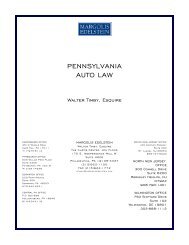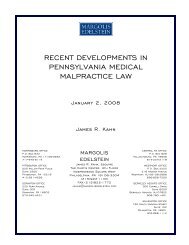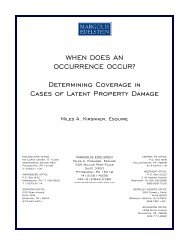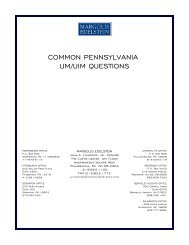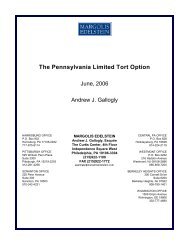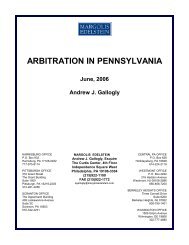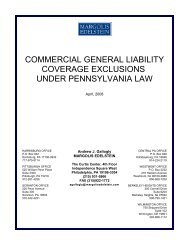selected topics in pennsylvania legal malpractice law - Margolis ...
selected topics in pennsylvania legal malpractice law - Margolis ...
selected topics in pennsylvania legal malpractice law - Margolis ...
You also want an ePaper? Increase the reach of your titles
YUMPU automatically turns print PDFs into web optimized ePapers that Google loves.
that <strong>in</strong> the circumstances is required by the standard of accepted <strong>legal</strong> practice, is also<br />
liable for <strong>malpractice</strong>.<br />
You may determ<strong>in</strong>e the standard of professional learn<strong>in</strong>g, skill, and care<br />
required of the defendant from the op<strong>in</strong>ions of the attorneys, <strong>in</strong>clud<strong>in</strong>g the an<br />
defendant, who have testified as expert witnesses as to such standard, or from other<br />
evidence you believe to be relevant to that determ<strong>in</strong>ation.<br />
It has been held that a local standard of practice may be applied. Hoyer v. Frazee, 323 Pa.<br />
Super. 421, 470 A.2d 990 (1984).<br />
The common <strong>law</strong> imposes on attorneys the status of fiduciaries for their clients, and thus an<br />
attorney’s failure to properly perform his fiduciary duties gives rise to cause of action. At common<br />
<strong>law</strong>, an attorney owes his client a fiduciary duty, which demands undivided loyalty and prohibits<br />
the attorney from engag<strong>in</strong>g <strong>in</strong> conflicts of <strong>in</strong>terest; breach of that duty is actionable. Maritans v.<br />
Pepper, Hamilton & Scheetz, 529 Pa. 241, 602 A.2d 1277 (1992).<br />
The Rules of Professional Conduct specifically <strong>in</strong>dicates <strong>in</strong> their preamble that they do not<br />
def<strong>in</strong>e the standard of care:<br />
Violation of a rule should not give rise to a cause of action nor should it<br />
create any presumption that a <strong>legal</strong> duty has been breached. The rules are designed<br />
to provide guidance to <strong>law</strong>yers and to provide a structure for regulat<strong>in</strong>g conduct<br />
through discipl<strong>in</strong>ary agencies. These are not designed to be a basis for civil liability.<br />
The lead<strong>in</strong>g case on this issue is Maritans v. Pepper, Hamilton & Scheetz, 529 Pa. 241, 602<br />
A.2d 1277 (1992). The Supreme Court held that the Rules of Professional Conduct and the prior<br />
Code of Professional Responsibility are not the proper basis of a civil claim aga<strong>in</strong>st an attorney but<br />
they also do not shield the attorney from conduct which would be actionable at common <strong>law</strong>.<br />
Simply because a <strong>law</strong>yer’s conduct may violate the rules of ethics does not mean that the conduct<br />
is actionable <strong>in</strong> damages or for <strong>in</strong>junctive relief. In other words, violations of the code of<br />
professional responsibility do not per se give rise to <strong>legal</strong> actions that may be brought by clients or<br />
other private parties, but they do not preclude such a claim from be<strong>in</strong>g brought aga<strong>in</strong>st an attorney<br />
when founded on elements of a recognized cause of action.<br />
However, the Pennsylvania Supreme Court has also held that attorneys cannot be liable for<br />
alleged misconduct under the Pennsylvania Unfair Trade Practice and Consumer Protection Law,<br />
73 P.S. 201-1, et seq., for actions <strong>in</strong>volv<strong>in</strong>g collection and distribution of settlement funds because<br />
the Rules of Professional Conduct provides exclusive governance of that activity. Beyers v.<br />
Richmond, 594 Pa. 654, 937 A.2d 1082 (2007). At the very least, Rules of Professional Conduct<br />
could likely <strong>in</strong>form an expert op<strong>in</strong>ion about the standard of care.<br />
-15-



